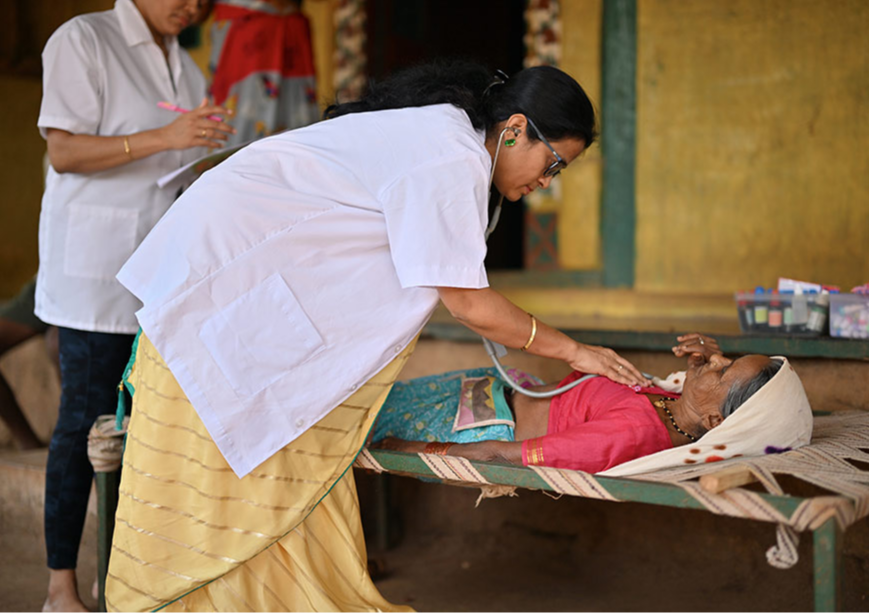-
CENTRES
Progammes & Centres
Location
Although the government has initiated schemes to extend proper healthcare, many sections of people are still excluded from its coverage or are unable to avail the medical benefits

This essay is part of the series titled: World Health Day 2024: My Health, My Right
Public health remains a fundamental aspect of society that significantly impacts the basic right to life with dignity. Several countries across the world have encapsulated the need for providing healthcare as part of providing social welfare to their citizens. India, as a robust and responsive welfare state, has over the decades increasingly strengthened its focus on providing better healthcare to its people. Though there is no explicit right to health enshrined in the Indian Constitution, several judicial pronouncements have reinforced that health is an inalienable part of the fundamental right to life, guaranteed by Article 21 of the constitution. However, the right to the enjoyment of the highest attainable standard of physical and mental health is not a recent phenomenon and has been underlined as a key priority area of governance by many international forums. Health as a right has been envisaged in the 1946 Constitution of the World Health Organization (WHO). The WHO’s preamble describes health as “a condition of total physical, mental, and social wellness, rather than simply the absence of illness or weakness.” The Universal Declaration of Human Rights of 1948 also included health as a right to an adequate standard of living (Article 25).
India, as a robust and responsive welfare state, has over the decades increasingly strengthened its focus on providing better healthcare to its people.
Furthermore, the right to health was reaffirmed as a fundamental human right in the 1966 International Covenant on Economic, Social, and Cultural Rights. In the last two decades, the emphasis on health as a basic right has been further reinforced by international bodies like organisations that monitor human rights under the WHO and the Human Rights Council created the Special Rapporteur mandate on the right to the highest attainable standard of physical and mental health for all. Also, health as a key indicator of human security and development aligns with the targets set by 17 UN Sustainable Development Goals (SDG) in which SDG 3 focuses on ‘Good Health and Well-being” which India is also committed to fulfilling. Hence, within the broad international institutional discourse on the primacy of healthcare, especially in the aftermath of COVID-19, India’s expansion in different dimensions of healthcare and health security within its social welfare architecture is befitting.
Although access to quality and affordable healthcare remains the fulcrum of perceiving health as an inalienable public good, the mandate of the right to health is much more broad-based. Essential developmental concerns like safe drinking water, hygiene and sanitation, safe and adequate nutritious food, healthcare awareness, healthy working conditions and equitable social spaces for the ability to express health challenges for eventually availing healthcare, are dimensions that constitute a holistic understanding of healthcare. In recent decades, multi-dimensional provisions for delivering healthcare, especially to the marginalised, became integral to India’s expansive social security architecture. Thus, reducing out-of-pocket medical expenditure, access to subsidised or affordable healthcare and addressing other health concerns like malnutrition, sanitation or hygiene, remain the core of India’s healthcare architecture which has gradually evolved within the broader social welfare and security architecture.
Multi-dimensional provisions for delivering healthcare, especially to the marginalised, became integral to India’s expansive social security architecture.
As envisioned by the National Health Policy of 2017, achieving universal health coverage remains one of India’s pivotal objectives. The central government’s major initiatives like Ayushman Bharat-Pradhan Mantri Jan Arogya Yojna have substantially increased the number of people under health insurance coverage, especially benefitting the economically weaker sections. Under this scheme, a beneficiary is entitled to free medical benefits up to INR 5 lakh per family per year. As the Ministry of Health data suggests, 9.22 crore Ayushman cards were created alone in the 2022-2023 period. Apart from that, there has been a wide array of extremely effective health insurance schemes rolled out by the different state governments that have further provided relief to lakhs of needy beneficiaries. Such policy interventions have largely reduced the out-of-pocket expenditure that has been a drain of resources for a vast section of people in the country. Especially, these health insurance schemes have substantially helped people during the COVID-19 pandemic, though several gaps and exclusions also persisted.
As health remains a state subject, the state governments have launched several initiatives to provide subsidised or free-of-cost treatment and medicines to the economically weaker sections. Also, the distribution of free food grains by both the centre and the state governments played a monumental role in fighting starvation and malnutrition amongst the poor through various state-level schemes and the Targeted Public Distribution System (TPDS). The Pradhan Mantri Garib Kalyan Anna Yojana, an extension of the 2013 National Food Security Act (NFSA), is the centre’s major food security scheme that provides free food grains to more than 80 crore people. Also, states have well-functioning schemes for further strengthening India’s food security architecture. Such initiatives are indispensable instruments of social welfare that prevent starvation and control malnutrition amongst the poor.
Factors such as poverty and economic dependence, cases of violence and social prejudice, infringement of control over sexual and reproductive choices, and lack of participation in decision-making processes are social concerns impacting the healthcare of women.
Women remain historically disadvantaged as far as adequately accessing and availing of healthcare facilities is concerned due to societal and structural challenges. Factors such as poverty and economic dependence, cases of violence and social prejudice, infringement of control over sexual and reproductive choices, and lack of participation in decision-making processes are social concerns impacting the healthcare of women. Several initiatives are undertaken by both the Centre and the state governments to adequately address the health challenges of women. Maternal mortality, which remained a vivid healthcare challenge in the last decades, has been remarkably reduced in recent years. Schemes have been rolled out by the Centre and the states to provide free or subsidised antenatal medical services to women. Many health schemes have been designed to bring women's membership of the household to the centre of the healthcare discourses so that social prejudices don’t obstruct them from availing healthcare benefits. The recent data reveals that 49 percent of the beneficiaries of the Ayushman Bharat-Pradhan Mantri Jan Arogya Yojna are women, increasing inclusiveness for women in India’s public health infrastructure. Initiatives like the Ujjwala scheme that provides free gas cylinders to women members of poor households have facilitated women to move from traditional cooking fuels that had a detrimental impact on the health of women, majorly in the rural areas.
However, there is much more to be done to further strengthen healthcare as a social welfare good. Although the government medical insurance schemes are controlling out-of-pocket medical expenditure, many sections of people are still excluded from its coverage or are unable to avail the medical benefits. Also, the need for further improvement in overall structures of health infrastructure and services like the availability of doctors to cater to the bludgeoning population, especially in rural and semi-rural areas, remains imperative. The challenge of malnutrition, though improved with time, still grapples with sizeable sections of children. As a vibrant welfare state functioning within a robust democracy, further strengthening of healthcare services to its people, is an extremely crucial aspect of India’s multi-dimensional social welfare landscape. Recently Rajasthan passed a bill to make health a fundamental right, the first state in India to pass such a legislation. The law is significant as it makes access to healthcare a legal entitlement for the people of the state. Such notable developments further pave the way for envisaging healthcare in India as not only a developmental imperative but also a crucial right for all its citizens.
Ambar Kumar Ghosh is an Associate Fellow at the Observer Research Foundation
The views expressed above belong to the author(s). ORF research and analyses now available on Telegram! Click here to access our curated content — blogs, longforms and interviews.

Ambar Kumar Ghosh is an Associate Fellow under the Political Reforms and Governance Initiative at ORF Kolkata. His primary areas of research interest include studying ...
Read More +